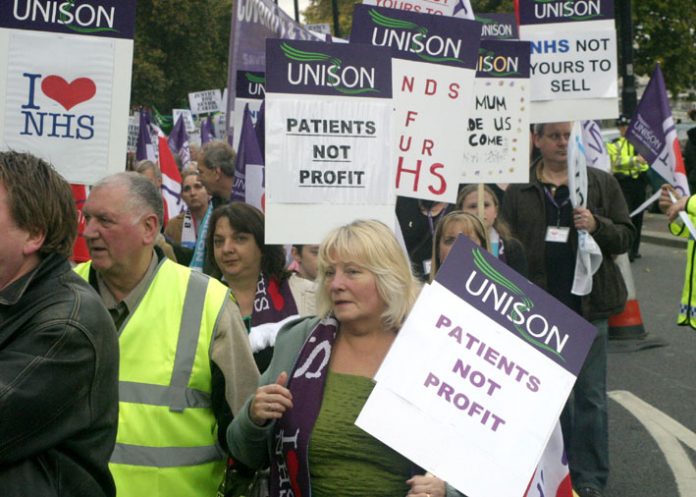Public sector union UNISON yesterday joined doctors in opposing government plans to replace NHS-run GP surgeries with ‘polyclinics’.
‘We are opposed to privately-run polyclinics,’ A UNISON spokeswoman told News Line yesterday.
‘We do not want to see GP surgeries overrun by the private sector.’
The British Medical Association condemned Saturday’s attack on GPs by health minister Lord Darzi.
Promoting privately-run ‘polyclinics’ in a BBC interview, Darzi claimed that single-doctor clinics belonged in the past.
He added: ‘I have no doubt in the future we are going to see a critical mass of general practitioners working together, rather than what we used to see in the past which were practices with a single-handed clinician.’
Richard Vautrey, deputy chairman of the British Medical Association’s GP committee said: ‘This is a government plan that is potentially going to waste hundreds of millions of pounds of scarce NHS resources, creating very large health centres that many areas of the country simply don’t need or want.’
Vautrey also warned that the government’s proposals would bring competition for NHS work from large multinational private companies, as has happened in Tower Hamlets, east London and Camden, north London.
The BMS’s Vautry warned: ‘They are effectively going to be looking for the cheapest bidder, who is going to run these health centres.’
UNISON also condemned the government cuts as it emerged that hospitals were keeping thousands of seriously ill patients in ambulance ‘holding patterns’ outside accident and emergency departments in order to meet government four-hour waiting targets.
Some patients were kept waiting for up to five hours in ambulances.
The UNISON spokeswoman told News Line: ‘We have been saying for years that the government needs to take action to stop unnecessary queues outside hospitals.
‘This is a waste of ambulance personnel’s time, who need to be free to deal with other emergencies.’
A&Es are pressed to meet the four-hour waiting limit because cuts have led to a situation where there are not enough beds available on medical and surgical wards.
UNISON added: ‘Lack of beds has a knock-on effect.
‘And there is not enough after-care, such as convalescent beds or care homes places, so people can get help when they leave hospital. Many people are kept in hospital because there is nowhere else for them to go.’
Dr Steve Field, chairman of the Royal College of GPs, called the situation ‘absurd, entirely inappropriate and unacceptable’.
The British Medical Association (BMA) stressed that A&E units are under pressure because of cutbacks in the number of hospital beds.
Chairman of the BMA consultants’ committee, Dr Jonathan Fielden said: ‘Undoubtedly some patients’ care will have suffered as a result of these delays.
‘The vast majority of patients coming into hospital by ambulance are in critical need of urgent care in hospital and therefore delay in getting to that critical care can worsen their outcome. That could include patients with heart attacks, certain types of strokes, breathing difficulties or trauma.’
